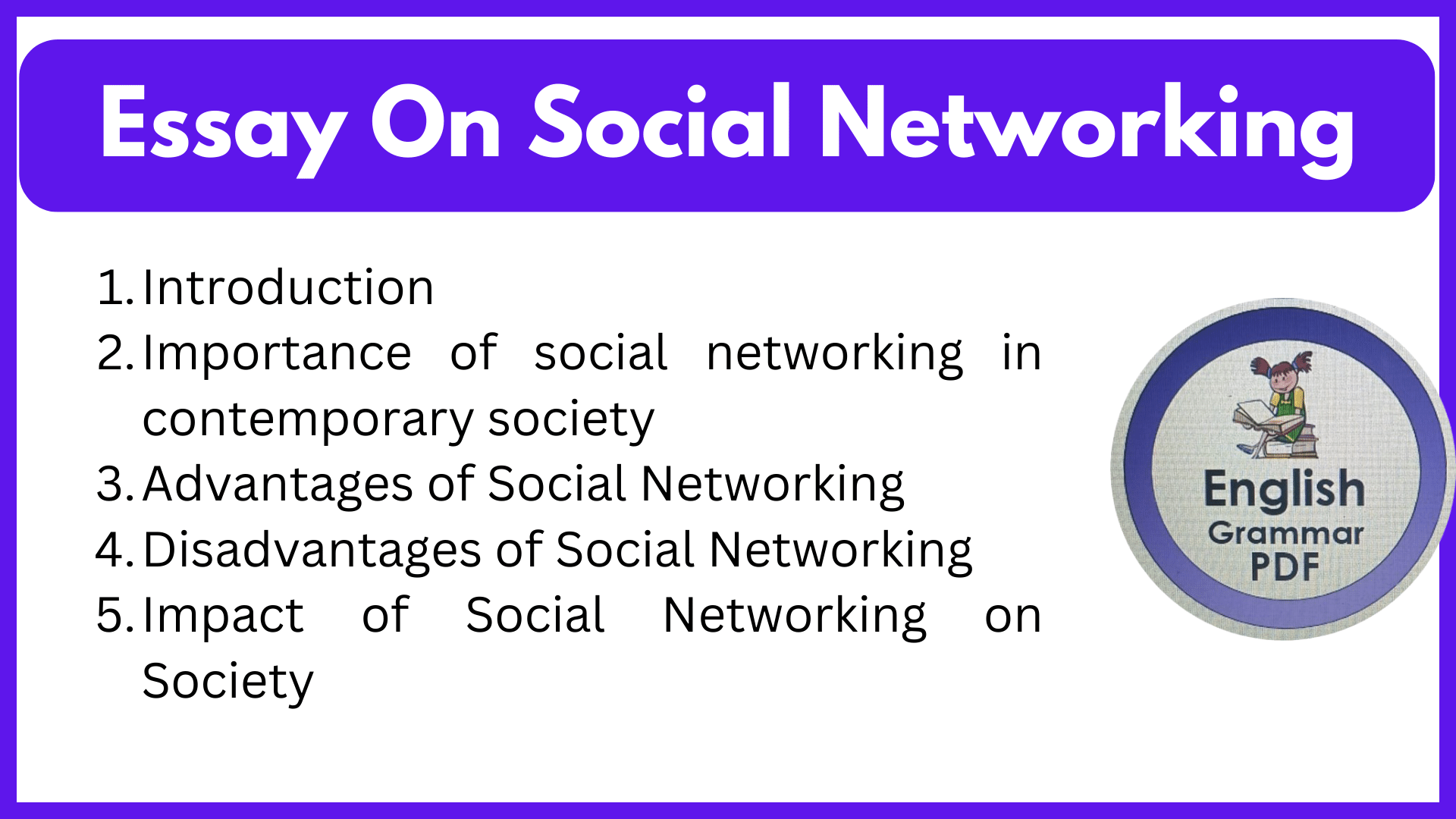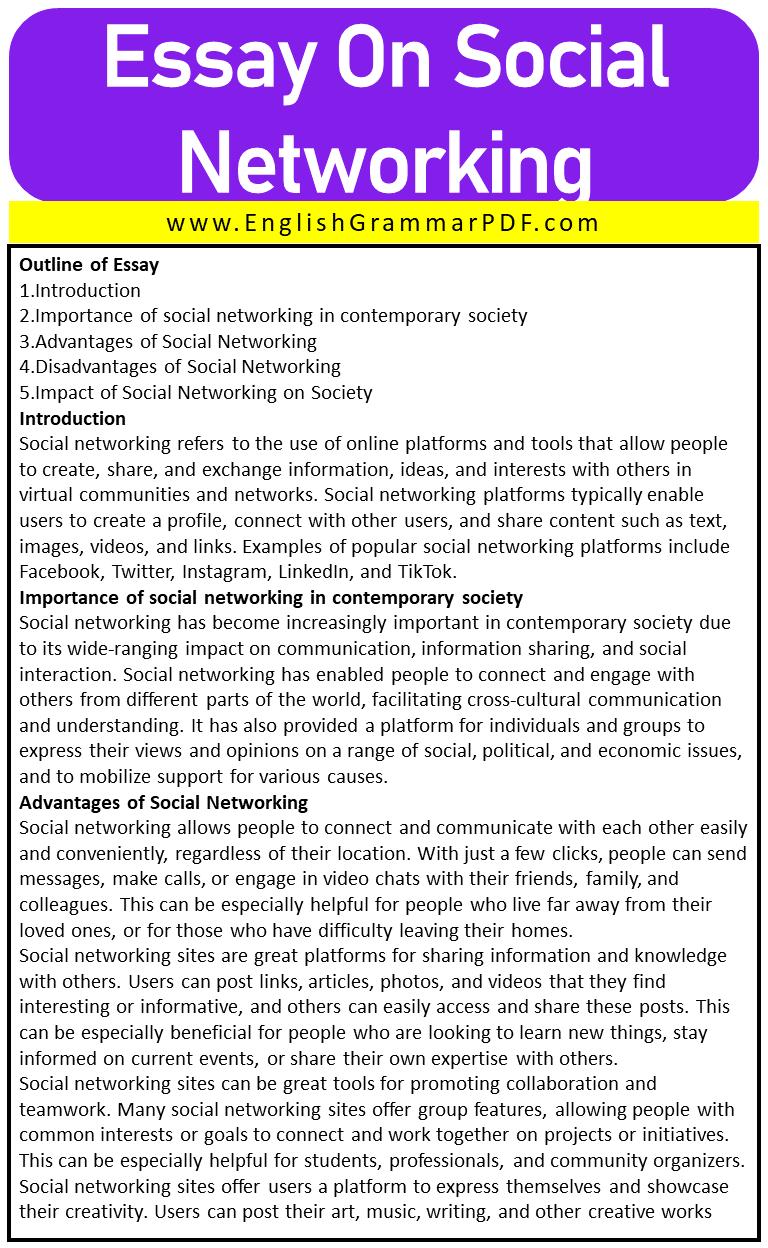Essay On Social Networking
Outline of Essay
- Introduction
- Importance of social networking in contemporary society
- Advantages of Social Networking
- Disadvantages of Social Networking
- Impact of Social Networking on Society
Introduction
Social networking refers to the use of online platforms and tools that allow people to create, share, and exchange information, ideas, and interests with others in virtual communities and networks. Social networking platforms typically enable users to create a profile, connect with other users, and share content such as text, images, videos, and links. Examples of popular social networking platforms include Facebook, Twitter, Instagram, LinkedIn, and TikTok.
Importance of social networking in contemporary society
Social networking has become increasingly important in contemporary society due to its wide-ranging impact on communication, information sharing, and social interaction. Social networking has enabled people to connect and engage with others from different parts of the world, facilitating cross-cultural communication and understanding. It has also provided a platform for individuals and groups to express their views and opinions on a range of social, political, and economic issues, and to mobilize support for various causes.
Advantages of Social Networking
Social networking allows people to connect and communicate with each other easily and conveniently, regardless of their location. With just a few clicks, people can send messages, make calls, or engage in video chats with their friends, family, and colleagues. This can be especially helpful for people who live far away from their loved ones, or for those who have difficulty leaving their homes.
Social networking sites are great platforms for sharing information and knowledge with others. Users can post links, articles, photos, and videos that they find interesting or informative, and others can easily access and share these posts. This can be especially beneficial for people who are looking to learn new things, stay informed on current events, or share their own expertise with others.
Social networking sites can be great tools for promoting collaboration and teamwork. Many social networking sites offer group features, allowing people with common interests or goals to connect and work together on projects or initiatives. This can be especially helpful for students, professionals, and community organizers.
Social networking sites offer users a platform to express themselves and showcase their creativity. Users can post their art, music, writing, and other creative works for others to see and enjoy. This can be especially helpful for people who may not have access to traditional channels for sharing their work, or who may be seeking feedback and support from a wider audience.
Social networking sites are valuable tools for businesses looking to connect with customers and promote their products or services. By using social media platforms to engage with customers, businesses can build relationships, increase brand awareness, and drive sales. This can be especially helpful for small businesses or startups that may not have large advertising budgets or established customer bases.
Disadvantages of Social Networking
The disadvantages of social networking include that:
Social networking platforms collect and store vast amounts of personal data, which can be exploited by third parties for targeted advertising or other purposes. Additionally, users may unintentionally share personal information with a wider audience than they intended, leading to privacy violations.
Social networking platforms can be a breeding ground for cyberbullying, which can have serious consequences for victims. Online harassment and hate speech can also create a hostile environment for marginalized groups. Social networking can be highly addictive, leading users to spend excessive amounts of time on the platform at the expense of other activities such as work, study, or socializing in person.
Social networking platforms have been criticized for their role in spreading false information, conspiracy theories, and propaganda. These can have serious real-world consequences, such as undermining public health efforts or inciting violence. Studies have shown that excessive social media use can contribute to feelings of loneliness, anxiety, and depression, as well as a distorted sense of self-image due to the constant comparison with others’ curated online personas.
Impact of Social Networking on Society
Social networking has fundamentally altered the way people communicate with one another. Social media platforms such as Facebook, Twitter, and Instagram have created new avenues for people to connect, enabling them to communicate across time zones and geographical barriers. However, this has also led to changes in the way people communicate. For instance, people now rely more on text-based communication and may be less inclined to communicate in person or over the phone.
Social networking has played a crucial role in shaping political and social movements across the world. The Arab Spring, for example, was largely fueled by social media, and it has since been used to mobilize protesters in other countries as well. Social media platforms have also provided a platform for marginalized groups to organize and demand change.
Social networking has also had a significant impact on personal relationships and social behaviour. People are now more likely to maintain long-distance relationships, and the ease of online communication has led to a blurring of boundaries between work and personal life. Social networking has also led to increased pressure to present a curated, idealized version of oneself online, leading to anxiety and feelings of inadequacy.
Social networking has also had implications for education and learning. On one hand, it has provided access to a wealth of educational resources, enabling people to learn about a variety of topics from anywhere in the world. However, it has also led to increased distractions and decreased attention spans, which can negatively impact academic performance.
Social networking has had significant economic and cultural implications. Social media platforms have created new opportunities for businesses to market their products and services, but they have also led to the rise of influencer culture and a focus on image over substance. Social networking has also led to the proliferation of fake news and echo chambers, which can exacerbate existing societal divisions.
FAQ’s
How can I use social networking for business or professional purposes?
To use social networking for business or professional purposes, you can create a profile for your company or personal brand, share content that showcases your expertise, and connect with others in your industry. You can also use social networking to find job opportunities and network with potential employers or clients.
Is social networking safe?
Social networking can be safe if used responsibly. Users should be aware of privacy settings and take precautions such as not sharing personal information with strangers, not clicking on suspicious links, and using strong passwords.
Explore More Essays:
Download the PDF of Essay:






